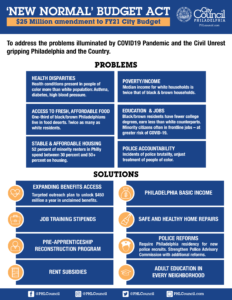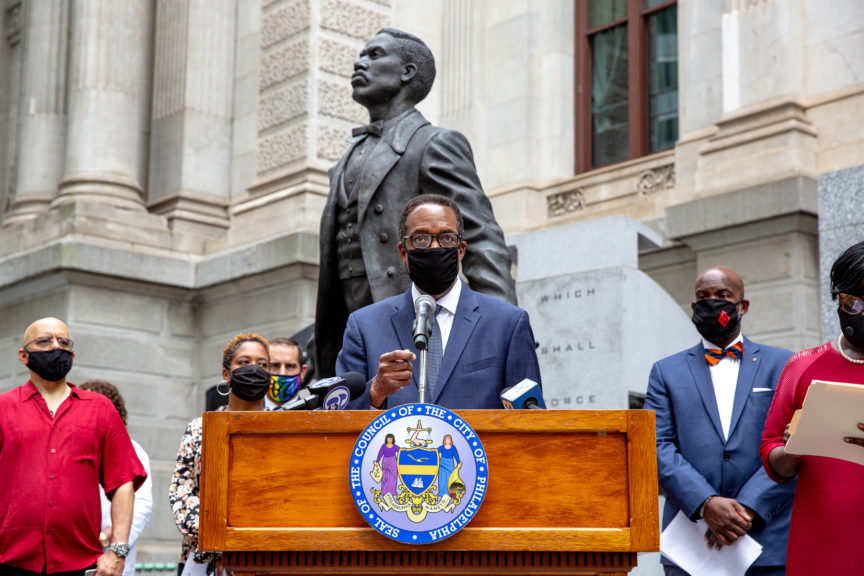PHILADELPHIA, June 5, 2020 — City Council today unveiled a significant initiative as part of the FY2021 Budget – a New Normal Budget Act that invests $25 million as a first step in addressing social ills and racial disparities laid bare by the COVID-19 pandemic and the civil unrest roiling the city and country since the murder of George Floyd by police in Minneapolis.
Building on the work of members of Council on such issues as the need for more affordable housing, health-care disparities among residents of color, a lack of healthy food options in under-served neighborhoods, the need for more living-wage jobs, and over 400,000 people living in poverty in Philadelphia, Council leaders announced an amendment to the proposed FY21 budget that addresses these ills and other problems illuminated by these crises that have wracked the country.
“The COVID-19 pandemic and unrest in our city and country these last few weeks have laid bare the disparities that were glossed over by a booming economy and years of cutting resources from our country’s social safety net,” Council President Darrell L. Clarke (5th District) said.
“The lack of access to affordable housing, health care, living wage jobs and healthy foods has been exposed by these crises – along with many problems. We cannot go back to that old normal,” Clarke said. “We need to create a ‘New Normal’ by addressing these disparities head on in our budget process. The New Normal Budget Act does that.”
Council’s budget amendment transfers $25 million from the city’s recession reserve fund and will re-target those funds into programs designed to address the social ills revealed by COVID-19 and the unrest, including:
Health disparities. Health conditions present in people of color – asthma, diabetes, high blood pressure – more than in white residents have contributed to a growing racial disparity of COVID-19 in Philadelphia. One solution the budget initiative will pursue is ensuring that vendors and people hired to do contact tracing and testing for COVID-19 infections look like the people they interact with.
“We need to address the underlying health disparities that lead to worse health outcomes for people of color,” said Majority Leader Cherelle L. Parker (9th District). “They are the ones dying at higher rates of all diseases, including COVID. We need to expand the City’s use of minority contractors, starting with the $92 million CDC grant the City was awarded, and what’s left of the $85 million emergency appropriation to fight the pandemic.”
Access to fresh, affordable food. One-third of black and brown Philadelphians live in food deserts – twice the rate of white city residents. This lack of access to healthy food choices contributes to long-term health issues for minority residents. One solution should include helping Philadelphians access $450 million in federal and state benefits that go uncollected – generating resources to purchase healthier food.
Stable, affordable housing. 52 percent of minority city renters spend between 30 percent and more than 50 percent of income on rent – leaving little funds available for food and other essentials. One solution is rent subsidies – recommended by Council’s Poverty Action Plan this spring.
“Our budget is a moral document,” said Councilwoman Maria D. Quiñones Sánchez (7th District), chair of Council’s Appropriations Committee. “We have a responsibility to secure Philadelphians’ right to raise our children in safe, affordable, accessible housing across diverse, mixed-income neighborhoods where everyone can share access to quality jobs, quality schools, and quality transit. We can achieve this goal by investing directly in rental assistance and eviction prevention for low-income households at a moment of unprecedented need and disparity.”
Poverty/income. Over 400,000 Philadelphians live in poverty – one in four residents. The Poverty Action Plan set a goal of lifting 100,000 out of poverty by 2023. The pandemic and widespread unemployment exacerbated the problem. One solution: Accessing the $450 million in uncollected benefits.
Education. Black and brown Philadelphians have far fewer college degrees and earn less than their white counterparts. Several solutions: Create adult education learning in every neighborhood, and offer job training stipends through Community College of Philadelphia.
Jobs/Employment. COVID-19 exposed the degree to which minority citizens work in frontline jobs like transit, health care, grocery/retail and health care, exposing them to infection. Various solutions exist here, including job training stipends.
Business Development and Expansion. Re-engineer the Department of Commerce into a center for entrepreneurial development and business expansion through public-private partnerships. A model for such growth is The Build from Within Alliance (Alliance), in St. Paul, MN, which organizes community-based organizations around the country with the goal of supporting the sustainable creation of minority and immigrant entrepreneurs. Another solution: Make BUY PHILADELPHIA the goal of our City’s procurement procedures and expand opportunities for minority-owned businesses to compete for city government contracts.
“Small, homegrown businesses are the backbone of our City,” said Councilmember Mark Squilla (1st District), chair of the Committee on Commerce and Economic Development. “They stabilize our neighborhoods and provide jobs to local residents. As we recover from COVID-19 and civil unrest, it is crucial to invest in a smart restart of our economy.”
Police reforms. Incidents of excessive use of police force have plagued many cities, not just Minneapolis, including Philadelphia. One solution is to require Philadelphia residency for new police recruits. Another is additional reforms to the Police Advisory Commission to strengthen its oversight capabilities and accountability.
“As we move forward to heal our city and nation, we must not allow the recent injustices between the police and members of the black community to continue to cause us frustration and pain, but instead use this opportunity to come together and work collectively and establish real reforms that will make a difference in our neighborhoods,” said Councilmember Curtis Jones, Jr. (4th District), chair of the Committee on Public Safety.
Council President Clarke said decisions on where the funds in the New Normal Budget Act would be directed would be made during the city budget process over the next several weeks. Council must approve a new city budget by June 30.
“Between COVID-19 and the unrest and protests this past week, the divisions and inequality in our city and country have never been clearer,” Clarke said. “We have to act boldly and swiftly to address them and begin the healing. Everything must change.”
Read the Budget Amendment:
New Normal Budget Act (amendment to Bill 200287)
Read the Fact Sheet:
New Normal Budget Act Fact Sheet
###


